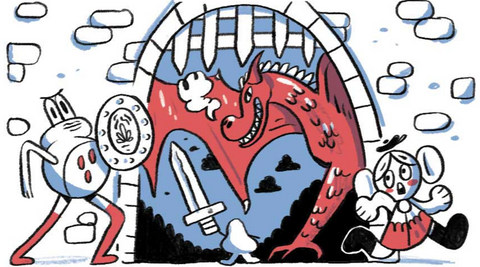This is the final episode from Storyteller Tactics' Kickstarter launch, brought to you by Pitch Perfect and No Easy Way
Remember when we last saw Steve and Charles?
A storyteller, struggling to teach innovation. And an innovator, struggling to find his story.
They met by chance, in a Manchester design agency, where Steve was running a story class. They got on, they swapped notes, they occasionally popped up on each other’s LinkedIn feeds.
Then, one day, a message: “Hey Steve. I’ve got a proposition for you. Free to chat?”
Fast forward to May 2021, everyone’s emerging slowly from lockdown. There’s a feeling of new life and opportunity in the air.
Steve and Charles are outside a pub in Manchester. It’s raining. They’re huddling under a summer umbrella, moving dozens of hand-written cards around a table. Charles’ dog is bored and has found a dry place to sleep.
“Should we have done this on a laptop?” Steve asks, as the rain smudges the ink on another one of the cards.
“No, there’s something more real about a handwritten card,” Charles says. “It’s a faff and they’re not cheap, but it’s worth it. Ok, how many tactics have we got?”
“Err.. seventy-ish,” says Steve. “We’ll have to lose a few.”
Steve works quietly, shifting and shuffling cards, muttering to himself: “Well, these tactics help you explore your world. These help you develop your character in the story. And these ‘function’ cards focus on what you need your story to achieve.”
Five minutes later, seventy-ish cards are sorted into seven neat piles.
“That looks good,” Charles says as both men survey their work. “I feel like we ought to try another iteration, y’ know, as design thinkers.”
“Yeah, but that feels spot on, doesn’t it,” says Steve.
“Well yes. Sometimes I guess your first instinct is right.”
And then, editing. Each card, read and re-read a dozen times, written and re-written. Steve goes off on flights of literary fancy. Charles brings him back to earth with the same question: "how is this helping our customer to tell his or her story? How is it helping them write an email or presentation?"
Finally, we get down to 54 cards. Then launch on Kickstarter. And now, here we are. Six years after Steve met Charles, Storyteller Tactics has sold 50,000 copies and rising.
So what's the moral of this story?
If you’re struggling to find your voice in a noisy world, don’t give up. You’re actually surrounded by all the elements you need to tell your own authentic story.
It isn’t easy, you’ll have false starts and tell stories that fall flat. But with Storyteller Tactics, and the support of the PipDecks community, you will find and tell great stories about your work.
These are the tactics I used in this final episode:
No Easy Way

Nothing good is ever easy. If a new thing was good and easy, you'd be doing it already. If you make your new idea - or new product - sound too good to be true, we get suspicious. If your story journey is from one success to another, it's boring. Give it some grit, with the No Easy Way tactic.
Pitch Perfect
My favourite model for a sixty second pitch is POPP: Problem (you’re struggling to find your voice); Opportunity (your story elements are all around you); Practical Steps (it won’t be easy, nothing good is ever easy) and Promise (come with us, we will help you tell great stories).










